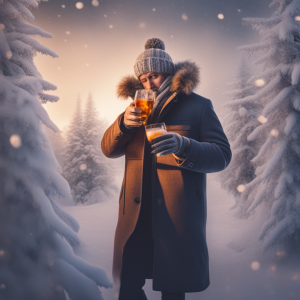Understand the Dangers of Alcohol Consumption in Freezing Weather and Stay Safe
As winter unfolds, particularly in extremely cold climates, the instinct to seek warmth often drives individuals to consume alcohol. However, it is crucial to recognize the significant risks that accompany this choice. This article will illuminate the dangers associated with alcohol use in frigid environments, highlighting why this habit not only jeopardizes your health but also fails to provide the warmth your body requires. By enhancing your understanding of these risks, you can make informed decisions that prioritize your safety and well-being during the harsh conditions of winter, ultimately allowing you to enjoy the season without jeopardizing your health.
Before exploring the related dangers, it’s essential to dispel the common myth that alcohol acts as a warming agent. When alcohol is consumed, it leads to the dilation of blood vessels near the skin’s surface, creating a deceptive sense of warmth. While this sensation can be comforting initially, it does not contribute to maintaining a stable internal body temperature. In fact, alcohol’s effects can be detrimental, diminishing your body’s ability to withstand cold temperatures and increasing the risk of severe conditions such as hypothermia and other serious health complications. Understanding this misconception is vital for making safer choices during the winter months.
 One of the most significant dangers associated with alcohol consumption in cold environments is the heightened risk of dehydration. Alcohol acts as a known diuretic, which increases urine production, leading to substantial fluid loss. Additionally, the cold air typically present during winter is drier, causing our bodies to lose moisture more rapidly. When these elements converge, it can result in dangerously low hydration levels, which are crucial for maintaining overall health and survival. Dehydration not only impairs physical performance but also compromises cognitive function, leading to difficulties in clear thinking and rational decision-making during critical situations.
One of the most significant dangers associated with alcohol consumption in cold environments is the heightened risk of dehydration. Alcohol acts as a known diuretic, which increases urine production, leading to substantial fluid loss. Additionally, the cold air typically present during winter is drier, causing our bodies to lose moisture more rapidly. When these elements converge, it can result in dangerously low hydration levels, which are crucial for maintaining overall health and survival. Dehydration not only impairs physical performance but also compromises cognitive function, leading to difficulties in clear thinking and rational decision-making during critical situations.
Recognize How Alcohol Consumption Impairs Your Judgment in Winter Conditions
Another serious consequence of consuming alcohol is its detrimental effect on cognitive function and decision-making abilities. In survival scenarios, the ability to make clear and rational decisions is essential for ensuring one’s safety. Alcohol consumption clouds judgment, making it increasingly challenging to respond effectively to potential dangers. This impaired reasoning can result in accidents and poor choices, which can have catastrophic outcomes in extreme cold. Remaining vigilant and aware of your surroundings is vital; however, alcohol consumption undermines this necessity, leading to a greater likelihood of mistakes that could endanger personal safety and well-being.
Moreover, alcohol consumption disrupts the body’s natural mechanisms for regulating its temperature. Upon ingestion, alcohol causes blood vessels in the skin to expand, facilitating increased heat loss. While this may initially create a comforting sensation of warmth, over time it accelerates the loss of core body heat, which is essential for survival. This dangerous cycle, where fleeting warmth gives way to a rapid decline in core temperature, significantly raises the risk of life-threatening conditions such as hypothermia. It’s essential to recognize that although alcohol may seem like a quick solution for combating cold, it ultimately increases your vulnerability to the harsh elements.
Explore the Alarming Connection Between Alcohol Use and Hypothermia Risk
In discussing the risk of hypothermia, it is important to grasp how alcohol consumption can obscure the early warning signs of this perilous condition. Hypothermia occurs when the body’s core temperature falls below the normal range, typically below 95 degrees Fahrenheit (35 degrees Celsius). Symptoms may include shivering, confusion, fatigue, and decreased coordination. However, alcohol consumption suppresses our body’s natural responses, making it more difficult to recognize these critical indicators. By the time hypothermia symptoms become apparent, it may be too late to avert severe injury or even life-threatening consequences. This highlights the importance of understanding the dangers of alcohol while in cold conditions.
In winter survival situations, there are numerous safer, more effective alternatives to alcohol for staying warm. Here are some strategies that can significantly bolster your ability to remain warm and safe:
1. Dress in Layers for Maximum Insulation: Wearing multiple layers of clothing is essential for trapping warm air effectively. Begin with thermal base layers, add insulating mid-layers, and finish with a windproof and waterproof outer layer to create a protective barrier against the cold.
2. Ensure Your Clothing and Footwear Remain Dry: Moisture can lead to rapid heat loss, making it critical to keep your clothing and footwear dry at all times. Opt for waterproof materials and change into dry garments whenever necessary to help maintain warmth.
3. Insulate Yourself from the Cold Ground: The use of sleeping mats or insulation pads can significantly reduce heat loss, particularly during sleep. This practice is vital for conserving body heat during prolonged exposure to cold environments.
4. Select Warm, Non-Alcoholic Beverages: Instead of resorting to alcohol, consider hot beverages such as tea, coffee, or hot chocolate. These drinks provide warmth without the adverse effects associated with alcohol consumption.
5. Seek or Construct Shelter for Protection: Actively looking for or building a shelter can greatly reduce exposure to harsh winds and freezing temperatures. A well-constructed shelter is instrumental in retaining body heat, significantly enhancing your chances of staying warm.
6. Fuel Your Body with High-Calorie Foods: Consuming nutrient-rich foods that are high in calories can provide your body with the energy needed to generate heat. Foods like nuts and fatty fish are excellent sources of healthy fats that can be particularly beneficial in cold climates.
Recognizing the risks tied to alcohol consumption in freezing temperatures is crucial for anyone engaged in winter survival scenarios. Despite the temporary illusion of warmth, alcohol can lead to dehydration, impaired decision-making, hindered temperature regulation, and mask the symptoms of hypothermia. By avoiding alcohol and adopting safe, effective strategies, you can enhance your chances of surviving and thriving in challenging winter environments. Stay alert, prepare thoroughly, and prioritize your safety above all else.
The post Hazards of Alcohol Consumption in Extreme Cold Conditions appeared first on Survival Bite.
The Article Alcohol Consumption Hazards in Extreme Cold Conditions Was Found On https://limitsofstrategy.com


This article really shines a light on an issue that often gets overlooked during the colder months. I’ve definitely found myself reaching for a warm drink like mulled wine in winter gatherings, thinking it will help me feel cozy. However, I’ve learned from experience how misleading that is—nothing beats a good hot cocoa for actual warmth!
You make a great point about how seasonal drinks can sometimes be more about vibe than actual warmth. It’s funny—when the cold hits, we tend to think of those comforting cocktails and hot wines, but they can leave you feeling chilly after the initial rush wears off. Hot cocoa really has its charm—its richness definitely gives that cozy feeling that lingers.
It’s interesting how our drink choices can shape our winter experiences. Mulled wine definitely has its charm—there’s something about the spices that feels festive. But you’re right about the warmth factor; it can be deceiving. Hot cocoa has this way of wrapping you in a cozy blanket from the inside out.
You raise a critical point about the misconception surrounding alcohol and warmth. When I was younger, I often heard people say they needed a drink to ‘take the edge off’ on a cold night, completely oblivious to the physiological dangers. The delayed onset of hypothermia can catch anyone off guard, especially when coupled with the illusion of warmth that alcohol provides. It’s also concerning how societal norms often glamorize drinking without addressing the real consequences.